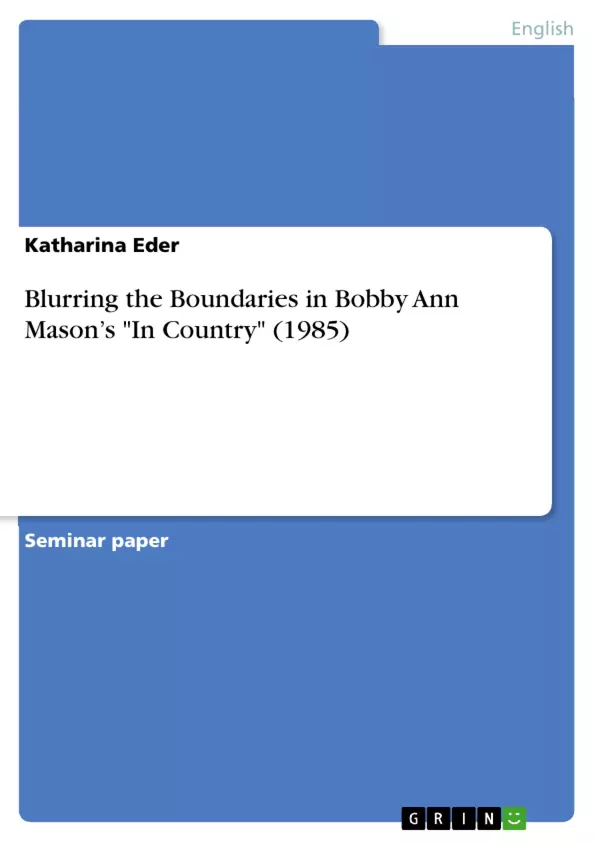Bobbie Ann Mason is one of the most important southern female writers at the end of the 20th century. Joseph M. Flora in his contribution to the The History of Southern Women’s Literature notes that “apart from Eudora Welty, few have more national visibility” (550). A number of Mason’s short stories were re-published in anthologies (see KcKee 359); her novel In Country became part of the syllabus in many high schools and colleges since its publication in 1985, and the 1989 Hollywood film adaptation starring Bruce Willis made her work accessible to an even broader audience. The critics have also shown a keen interest in her work as the huge number of overwhelmingly positive literary reviews and academic publications demonstrate (see Flora, Fiction 282-285). The topics Mason raises in her work seem to strike a chord with both the general as well as the professional readers. As one scholar put it, the most important innovation of the contemporary realist authors such as Mason “is their ability to portray the experiences of people from a lower economic class with realism, complexity, and dignity”. (Hovis, K Mart 395f.) In her work, Bobbie Ann Mason describes a contemporary southern society from a white working-class perspective, mostly places and characters that are well known to her, without looking down on what could be perceived as their lack of education or backwardness. It also reflects the socio-economic, historical and cultural changes and the loss of traditional certainties that the U.S., and in her case particularly the rural and semi-rural areas of Kentucky, have faced over the last century. In In Country, Mason pays homage to the countercultural movements of the 1960s and 1970s that have played a pivotal role in the shaping of western societies as we know them today; the all-pervading theme, however, is the Vietnam War and its aftermath. This paper will focus on a particular aspect fostered by the historical events and developments of the 1960s and 1970s, namely the dissolution of conventional binary oppositions such as that of “Man” and “Woman”, elitist and mass culture, reality and fiction, past and present, “the North” and “the South” and the trespassing of boundaries in Mason’s novel In Country.[...]
Inhaltsverzeichnis (Table of Contents)
- Introduction
- Biography
- In Country: Content and Form
- Characters
- Structure
- Narrative Technique
- Style
- Socio-economic and Cultural Background
- The Vietnam War
- The Countercultures of the 1960s and 1970s
- Blurring the Boundaries
- “Reality” and “Representation”
- \"High\" and \"Low\" Culture
- \"Man\" and Woman
- \"The North” and “The South”
- Conclusion
Zielsetzung und Themenschwerpunkte (Objectives and Key Themes)
The purpose of this paper is to explore the blurring of boundaries in Bobbie Ann Mason's novel In Country, focusing on the dissolving of conventional binary oppositions that emerged from the historical events and cultural developments of the 1960s and 1970s. The novel portrays a contemporary southern society from a white working-class perspective, showcasing the socio-economic and cultural changes that have impacted rural Kentucky.
- The impact of the Vietnam War on individuals and communities
- The blurring of lines between “reality” and “representation”
- The challenge of traditional gender roles
- The complexities of class and cultural identity
- The influence of the counterculture movement
Zusammenfassung der Kapitel (Chapter Summaries)
The introduction provides an overview of Bobbie Ann Mason's work and her significance as a Southern writer, highlighting her focus on contemporary southern society from a working-class perspective. It specifically discusses In Country's exploration of the Vietnam War and its lasting impact.
The biography section examines Mason's life, highlighting her experiences in rural Kentucky and her academic journey, and how these experiences shaped her writing. It focuses on her interest in popular culture and her early literary career.
The chapter on In Country provides a detailed analysis of the novel's content and form, exploring its characters, structure, narrative technique, and style. It focuses on the main character Sam Hughes, her search for her father and her own future, and her complex relationship with her family.
The chapter on the socio-economic and cultural background of the novel discusses the Vietnam War and the countercultures of the 1960s and 1970s, providing a context for understanding the themes and characters in In Country.
Schlüsselwörter (Keywords)
This paper focuses on the exploration of blurring boundaries in Bobbie Ann Mason's In Country. Key themes include the Vietnam War, Southern identity, rural life, working-class experiences, counterculture, and the dissolution of traditional binary oppositions such as "Man" and "Woman," "high" and "low" culture, and "reality" and "representation."
Frequently Asked Questions
What is the central theme of Bobbie Ann Mason's "In Country"?
The all-pervading theme is the Vietnam War and its aftermath, specifically how it impacts a white working-class family in rural Kentucky.
Who is the main character of the novel?
The protagonist is Sam Hughes, a teenager searching for information about her father who died in Vietnam before she was born.
What does "blurring the boundaries" mean in this context?
It refers to the dissolution of binary oppositions like "Man/Woman", "High/Low culture", and "Reality/Fiction" influenced by the 1960s counterculture.
How are gender roles challenged in "In Country"?
The novel explores the trespassing of conventional gender boundaries and the changing socio-economic roles of men and women in the late 20th century.
Why is Bobbie Ann Mason considered a significant Southern writer?
She is noted for her ability to portray the experiences of the working class with realism, complexity, and dignity without being condescending.
- Arbeit zitieren
- Bachelor Katharina Eder (Autor:in), 2009, Blurring the Boundaries in Bobby Ann Mason’s "In Country" (1985) , München, GRIN Verlag, https://www.grin.com/document/171935



